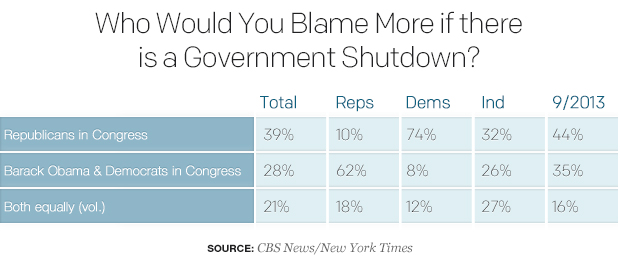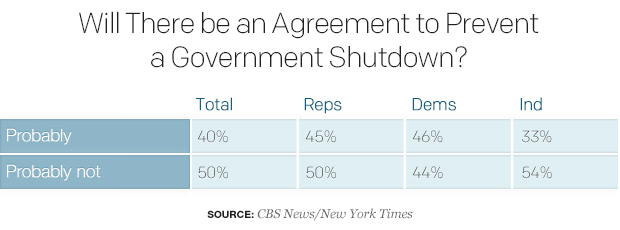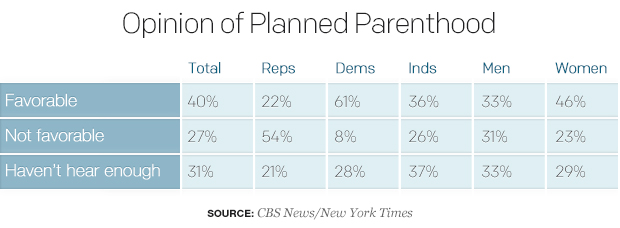Poll: Who would be blamed for government shutdown?
By Anthony Salvanto, Jennifer De Pinto, Sarah Dutton and Fred Backus
If Government Shuts Down, Republicans Would Get More Blame
Washington is faced with a potential federal government shutdown when funding for the government runs out on Wednesday night.
If there is a federal government shutdown, Republicans in Congress would get more of the blame (39 percent) than President Barack Obama and the Democrats (28 percent), but one in five Americans volunteer they would blame both sides. Back in 2013, with a government shutdown looming, Republicans also received more blame.
Most Americans say threatening a government shutdown is not an acceptable way for members of Congress to negotiate. Majorities across party lines are in agreement, although Republicans are more likely to say threatening a shutdown is an acceptable negotiating tactic.
Fewer than half say they have been following news about a possible federal government shutdown closely, including only 14 percent who have been following this news very closely. More Americans were paying attention two years ago, shortly before a partial federal government shutdown that lasted just over two weeks.
Fifty percent of Americans do not think an agreement will be reached to avoid a federal government shutdown, but 40 percent think one will be, preventing a shutdown. Republicans and independents are more inclined than Democrats to think an agreement won't be reached and a shutdown will occur.
Americans who are following news about a potential shutdown at least somewhat closely are more likely to think an agreement will be reached (46 percent), compared to those who are not following the story closely (34 percent).
Planned Parenthood
At the center of a potential shutdown is a disagreement over funding for Planned Parenthood. Most Americans disagree with the core premise of the budget dispute: that Planned Parenthood should be deprived of federal funding. Fifty-five percent of Americans think the federal government should continue to provide funding to Planned Parenthood, including eight in 10 Democrats and just over half of independents. Sixty-six percent of Republicans disagree.
Women are more likely than men to think Planned Parenthood should receive federal funding.
Even among those who think funding should be cut off, most - 53 percent - don't think it's worth shutting down the government.
Americans have a net favorable view of Planned Parenthood, though many don't have an opinion. Forty percent of Americans view Planned Parenthood favorably, compared to 27 percent who have an unfavorable opinion of the organization. Another 31 percent of Americans haven't heard enough to say.
There are stark partisan differences: Most Democrats view Planned Parenthood favorably, while most Republicans hold an unfavorable view. Also, while men are divided in their views of Planned Parenthood, women are more inclined to view the organization favorably.
This poll was conducted by telephone September 23-27, 2015 among a random sample of 1,000 adults nationwide. Data collection was conducted on behalf of CBS News and The New York Times by SSRS of Media, PA. Phone numbers were dialed from samples of both standard land-line and cell phones.
The poll employed a random digit dial methodology. For the landline sample, a respondent was randomly selected from all adults in the household. For the cell sample, interviews were conducted with the person who answered the phone.
Interviews were conducted in English and Spanish using live interviewers.
The data have been weighted to reflect U.S. Census figures on demographic variables.
The error due to sampling for results based on the entire sample could be plus or minus four percentage points. The error for subgroups may be higher and is available by request. The margin of error includes the effects of standard weighting procedures which enlarge sampling error slightly.
This poll release conforms to the Standards of Disclosure of the National Council on Public Polls.



